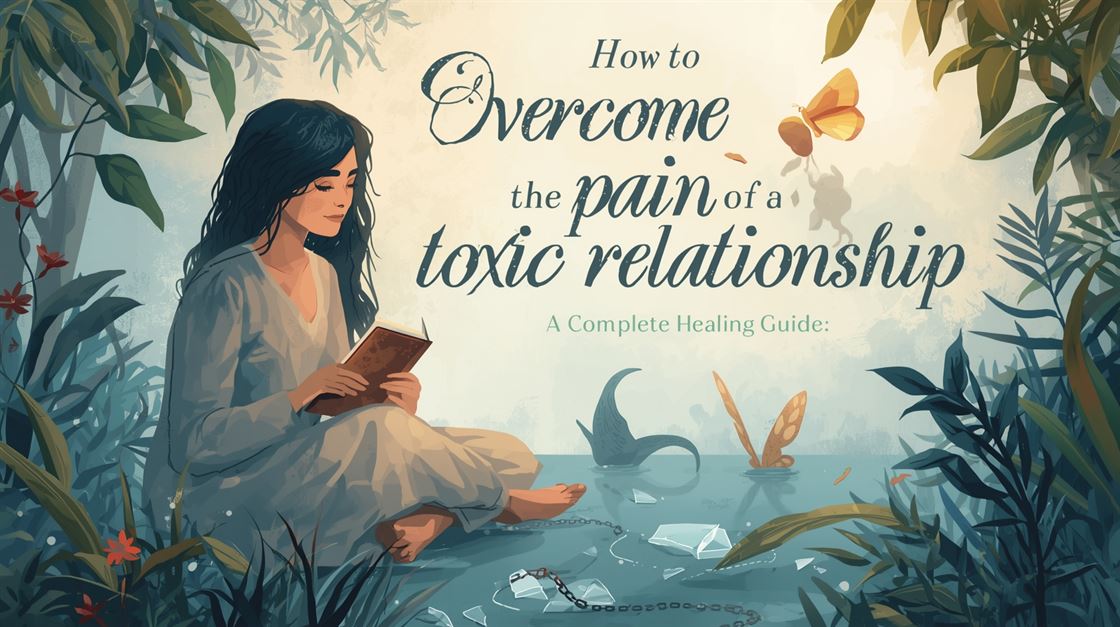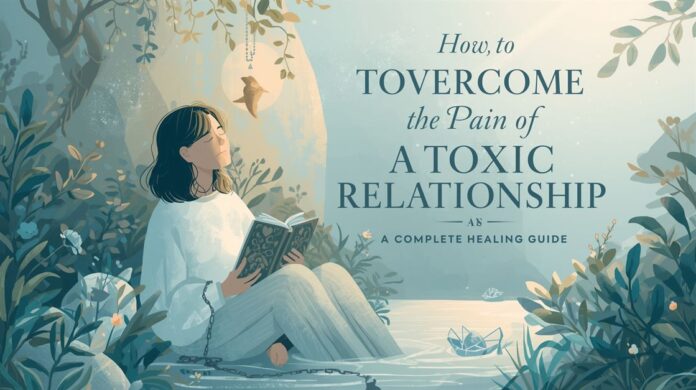The end of a toxic relationship is one of the most painful emotional experiences a person can go through. It is not just a breakup—it is the collapse of a world you carefully built, a dream you invested your heart in, and a future you imagined with someone you deeply loved. Toxic relationships leave behind scars that run deep: emotional exhaustion, self-doubt, confusion, shame, broken trust, and a damaged sense of self.
Yet, despite all the pain, one truth remains:
Healing is absolutely possible.
You can reclaim your happiness.
You can recover your identity.
You can find healthy love again—starting with love for yourself.
This article is your complete healing guide. It follows the tone, depth, structure, and polished narrative style of The Relationship Tips website—educational, compassionate, empowering, and practical.
Let us begin your journey back to emotional freedom.
READ MORE: Unlock Your Relationship: Essential Questions to Ask Your Boyfriend
In This Article
- 1 What Exactly Makes a Relationship “Toxic”?
- 2 Why Healing From a Toxic Relationship Hurts So Deeply
- 3 Breaking Free: The First Step Toward Healing
- 4 Reclaiming Yourself After a Toxic Relationship
- 5 Emotional and Psychological Healing
- 6 Letting Go and Moving Forward
- 7 Rebuilding Your Life After Toxic Love
What Exactly Makes a Relationship “Toxic”?
Before healing can begin, clarity must come first.
A relationship becomes toxic when the pain outweighs the peace, when the connection drains you more than it nurtures you, and when your partner’s behaviors repeatedly harm your emotional wellbeing.
A toxic partner may:
-
Constantly belittle or criticize you
-
Gaslight you
-
Manipulate your feelings
- Advertisement - -
Use silence as punishment
-
Demand without giving
-
Betray trust repeatedly
-
Control your movements, choices, or friendships
-
Create chaos, fear, or emotional instability
But here is the truth many people avoid:
Most toxic relationships do not start toxic. They become toxic slowly, subtly, quietly.
The result?
You end up holding onto someone who hurts you—because you keep remembering who they were, not who they have become.
This emotional confusion creates the pain you are currently trying to heal.
Why Healing From a Toxic Relationship Hurts So Deeply
Healing hurts because the love was real—even if the relationship was not healthy.
You may be feeling:
-
Confusion about why things turned out this way
-
Anger at yourself for staying
-
Guilt for leaving
-
Attachment to memories
-
Shame for loving someone who hurt you
-
Fear of starting your life over
-
Loneliness after cutting off someone who became a habit
These emotional reactions are normal.
You are not weak.
You are not foolish.
You are not “too emotional.”
You are simply human—and humans bond deeply.
But the good news is that pain is not permanent. With the right steps, you can rise again.
Breaking Free: The First Step Toward Healing
1. Accept the Truth: It Was Toxic
Healing begins with honesty.
Many people stay stuck because they cling to the hope that things “could have been different.” But acceptance does not mean you approve of what happened—it simply means you acknowledge reality.
Ask yourself:
-
Did the relationship bring out the best in you or the worst?
-
Did you feel emotionally safe or emotionally drained?
-
Were your needs respected or dismissed?
-
Were your boundaries honored or violated?
-
Did love feel peaceful or painful?
Acceptance clears the fog.
Clarity brings relief.
Truth sets you free.
2. Cut Off All Contact (At Least Temporarily)

Healing requires distance.
Whether it’s for weeks or months, no contact gives your heart space to breathe, think, and reset.
This includes:
-
Not texting
-
Not calling
-
Not checking their social media
-
Not responding to their messages
-
Not meeting “just to talk”
-
Not asking mutual friends about them
Every contact reopens the wound.
Every silence strengthens your recovery.
Remember:
You cannot heal in the same environment that broke you.
3. Let Yourself Grieve Fully
Healing requires grieving. Toxic relationships create grief for many reasons:
-
You’re grieving the person you loved.
-
You’re grieving the version of yourself that tolerated pain.
-
You’re grieving lost time and dreams.
-
You’re grieving attachment and habits.
-
You’re grieving what you hoped the relationship could be.
Cry if you need to.
Write in a journal.
Talk to a friend.
Pray.
Sit quietly with your thoughts.
Grief is not a setback—it’s a part of your healing journey.
4. Stop Blaming Yourself
Most survivors of toxic relationships blame themselves:
“I should have left earlier.”
“I should have seen the signs.”
“I shouldn’t have allowed this.”
“I must be the problem.”
Stop.
You stayed because you loved.
You tried because you cared.
You held on because you believed in them.
That is not stupidity.
That is loyalty—and loyalty is a strength, not a flaw.
But now that you know better, you will do better.
Forgive yourself. You did what your heart understood at the time.
Reclaiming Yourself After a Toxic Relationship
The most painful part of a toxic relationship is how it damages your sense of identity.
Now it’s time to rebuild yourself.
5. Re-Discover Who You Are Without Them
When you are with a toxic partner, you slowly lose parts of yourself.
Your confidence.
Your joy.
Your hobbies.
Your friendships.
Your dreams.
Healing requires re-discovering who you were before them—and becoming someone even stronger.
Ask yourself:
-
What activities used to make you happy?
-
What goals did you abandon?
-
What friendships did you lose touch with?
-
What passions did you silence?
Start small.
Take a walk.
Listen to music.
Write.
Cook.
Travel.
Go out with friends.
Learn a skill.
Rebuild your spirit one step at a time.
6. Rebuild Your Self-Worth and Confidence
Toxic partners often damage your self-esteem:
“You’re not enough.”
“You can’t do better than me.”
“No one will love you like I do.”
“You’re too emotional.”
These words break your confidence slowly.
To heal, you must challenge every lie they planted.
Here are affirmations to repeat daily:
-
I deserve peace.
-
I deserve respect.
-
I deserve healthy love.
-
I am becoming stronger every day.
-
I am not defined by my past.
Confidence is not built in a day, but with consistent self-love, it returns.
7. Rebuild Your Boundaries
In toxic relationships, your boundaries were violated repeatedly.
Healing requires creating new, stronger boundaries such as:
-
Saying no without guilt
-
Cutting off harmful people
-
Not accepting emotional abuse
-
Refusing manipulation
-
Expecting respect from future partners
Boundaries are not walls.
They are doors with locks—and you hold the key.
8. Reconnect With Your Support System
Toxic partners often isolate you gradually.
Now, reconnect with:
-
Trusted friends
-
Supportive family
-
Mentors
-
Communities
-
Faith-based groups
-
Therapists or counselors
You do not have to heal alone.
Love from others reminds you of your worth.
Emotional and Psychological Healing
9. Understand the Trauma Bond
A trauma bond is the emotional attachment formed with someone who hurts you but also occasionally gives affection, creating cycles of emotional highs and lows.
It feels like love—but it is not love.
It is addiction to inconsistency.
You heal a trauma bond by:
-
Staying away
-
Recognizing patterns
-
Replacing emotional chaos with emotional stability
-
Building healthy habits
-
Strengthening self-worth
Once you understand the bond, you break free from its power.
10. Stop Romanticizing the Past
One of the hardest parts of healing is overcoming selective memory.
You remember:
-
The good times
-
The sweet moments
-
The apologies
-
The honeymoon phases
-
The promises
But you forget:
-
The tears
-
The anxiety
-
The disrespect
-
The cheating
-
The insults
-
The loneliness inside the relationship
To heal, remind yourself of the whole picture, not just the highlights.
11. Avoid Rebound Relationships
Jumping into another relationship immediately is tempting, but it rarely helps.
You cannot heal from one wound by creating another.
Give your heart time to rest.
Give your mind space to think.
Give your soul space to breathe.
Rebounds delay healing—and often repeat the same patterns.
12. Consider Therapy if Needed
There is no shame in seeking help.
A professional can assist with:
-
Emotional trauma
-
Post-toxic relationship anxiety
-
Abandonment wounds
-
Attachment issues
-
Codependency
-
Self-worth rebuilding
Healing is not weakness. Healing is wisdom.
Letting Go and Moving Forward

13. Release the Need for Closure
Many people get stuck waiting for closure:
-
“I want them to admit they were wrong.”
-
“I want them to explain why they hurt me.”
-
“I want them to say sorry.”
-
“I want them to understand what they did.”
But some people are emotionally incapable of giving closure.
Closure does not come from them.
Closure comes from accepting what happened, learning from it, and moving on.
Letting go is the final gift you give yourself.
14. Create a New Vision for Your Life
Without a vision, you drift back to old patterns.
Start planning:
-
New goals
-
A new lifestyle
-
A new routine
-
A new self-care plan
-
A new career direction
-
A new mindset
Your future deserves your energy more than your past does.
15. Learn What Healthy Love Looks Like
Healing requires education.
Healthy love is:
-
Calm
-
Respectful
-
Consistent
-
Honest
-
Patient
-
Supportive
-
Safe
-
Kind
Healthy love does not confuse you.
It does not drain you.
It does not make you question your worth.
When you understand healthy love, you will never settle for toxic love again.
16. Forgive Yourself for Staying So Long
You did not stay because you were weak—you stayed because you loved.
You hoped they would change.
You believed in their potential.
You saw the good in them.
You gave chances from a pure heart.
Forgive yourself.
Healing starts with compassion.
17. Believe That You Deserve Better
Many survivors unconsciously believe:
“Maybe this is all I deserve.”
“Maybe healthy love isn’t meant for me.”
Stop.
You deserve:
-
Peace
-
Respect
-
Loyalty
-
Safety
-
Emotional stability
-
True partnership
-
Genuine affection
-
A love that doesn’t hurt
You deserve everything you give to others.
Rebuilding Your Life After Toxic Love
This is the transformation phase—where pain becomes strength.
18. Transform Your Pain Into Power
Your experience did not break you—it shaped you.
You learned:
-
How to recognize red flags
-
How to protect your heart
-
How to choose better
-
How strong you truly are
Pain can become your greatest teacher if you let it.
19. Rebuild Your Routine and Habits
New habits support a new life.
Add:
-
Morning affirmations
-
Journaling
-
Fitness
-
Healthy eating
-
Prayer or meditation
-
Reading
-
Financial planning
-
New hobbies
A structured life leads to emotional stability.
20. Surround Yourself With Positivity
Healing requires the right environment.
Remove:
-
Negative people
-
Toxic relatives
-
Damaging friends
-
People who gossip
-
Anyone who brings you down
Add:
-
Supportive people
-
Positive energy
-
Safe spaces
-
Motivational content
-
Uplifting environments
Your circle determines your healing speed.
21. Learn to Love Yourself Deeply
Self-love is not about spa days or new clothes—it’s about how you treat your soul.
Self-love means:
-
Choosing your peace
-
Prioritizing your needs
-
Speaking to yourself kindly
-
Not settling for less
-
Believing in your worth
When you genuinely love yourself, toxic people lose access to you.
22. Embrace Emotional Freedom
Healing ends when you reach emotional freedom:
-
No more crying over the past
-
No more hoping they return
-
No more feeling guilty for leaving
-
No more blaming yourself
-
No more checking their social media
-
No more emotional attachment
You are finally free.
Conclusion: You Will Love Again—But From a Stronger Place
The pain of a toxic relationship is real, deep, and life-changing—but it does not define your future.
You deserve a love that:
-
Brings peace
-
Respects your boundaries
-
Values your emotions
-
Protects your heart
-
Helps you grow
-
Never makes you question your worth
Healing is not immediate.
Healing is not linear.
Healing is not perfect.
But every day you choose yourself, the pain loses power.
With time, you will wake up and realize:
-
You no longer miss them
-
You no longer hurt
-
You no longer feel guilty
-
You no longer desire the past
-
You no longer crave chaos
-
You are finally happy again
You survived what was meant to break you.
And now, you are becoming someone stronger, wiser, and more beautiful than before.
Your heart will love again.
And this time—it will be the love you truly deserve.





